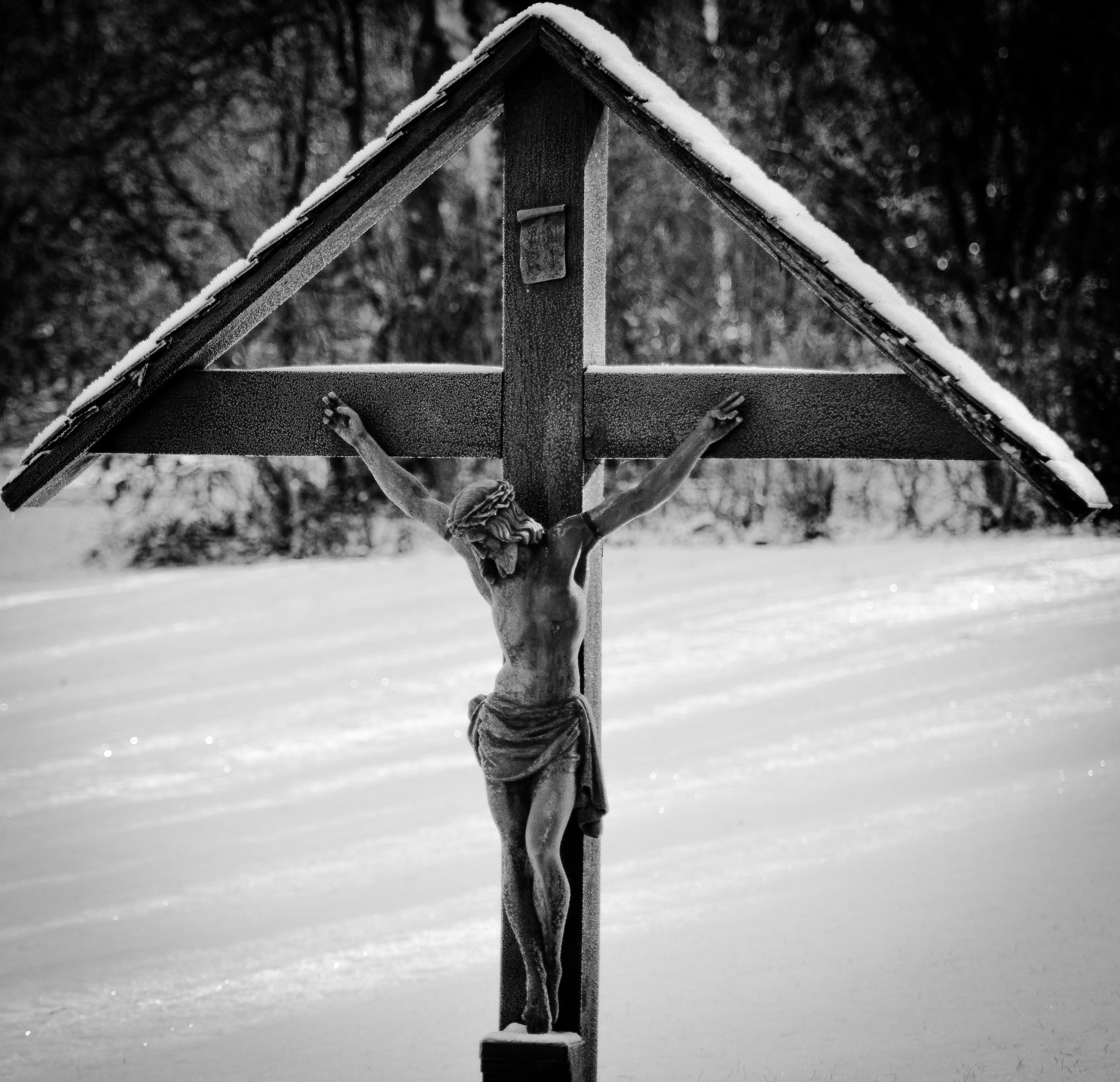FOR HERE TOO GOD IS PRESENT: EXPERIENCE OF THE WEAKNESS OF GOD IN FIRST CORINTHIANS
The heart of Christian faith life is the profession of Jesus’ Name. It is the fundamental trust that the power of God lay in Jesus of Nazareth, and that through Him God’s power comes to us. But what exactly is this power? Is it the power to name and claim what I want? Hardly. It is the power, not of some worldly victory, but of the victory over sin, death and all the spiritual forces of darkness. It is the power of Christ crucified, which Paul tells us is a stumbling block to the Jews and foolishness to the Gentiles – it is a power, in other words, that is contemptible nonsense to all worldly valuations.
(JUST) WHAT (KIND OF) NONSENSE IS THIS?
But what is makes this faith apparent nonsense? Is it nonsense because it is irrational? Not according to Paul. Is it nonsense because it is without empirical evidence? This is also unlikely. After all, he speaks of witnesses to Christ’s resurrection in his first letter to the Corinthians (which I will be using extensively here). “He was seen by Cephas, then by the twelve” he writes. “After that He was seen by over five hundred brethren at once, of whom the greater part remain to the present, but some have fallen asleep. After that He was seen by James, then by all the apostles. Then last of all He was seen by me also, as by one born out of due time” (1 Cor. 15:5-8, NKJV, emphasis mine). Eyewitness reports are as good as evidence gets in this sort of case (there can be no controlled laboratory test to check for One who is firstborn among the dead); and Paul here is claiming that he has mass eyewitness testimony.
Whence, then, comes the claim of nonsense? How does Christ offend against good, common sense? The offense, according to Paul, is the weakness of Christ. For as he writes, Christ is “the power of God and the wisdom of God” – and yet He was visibly, manifestly weak (1 Cor. 1:24, NKJV). After all, Jesus was relatively poor, nothing special to look at, and kept questionable company: he dined amongst prostitutes, tax collectors, and other abhorrent types.
Moreover, his teaching was lambasted by leaders of the time: Jesus’ conflicts with the Pharisees (a group that advocated living the Torah in everyday life, according to rather strict codes) is well-documented in the gospels; and he also had heated exchanges with the Sadducees (an elite group, who denied certain difficult doctrines like the resurrection of the dead). The Sanhedrin, the judicial council of Jerusalem, found him guilty of blasphemy (among other things). Indeed it was the ire He drew from these Jewish leaders, as well as the Gentile Roman authorities they colluded with, that ultimately led to His crucifixion – which, for Paul (himself a former Pharisee), was the ultimate example of His powerful weakness.
But “the foolishness of God is wiser than men, and the weakness of God is stronger than men” (1 Cor. 1:25, NKJV, my emphasis). God, the all-powerful, is weak in Christ – rejected, despised, defeated and condemned to die. And yet this weakness is the key to His power. Paul’s letter to the Corinthians is a deep exploration of this truth. This, he thinks, is what his congregation in Corinth has forgotten, and this amnesia has caused division and strife. For the rest of this post, I will explain the fundamental truth, and with it the fundamental faith-experience, that is at the heart of Paul’s criticism here.
GOD HAS CHOSEN THE WEAK
“God has chosen the foolish things of the world to put to shame the wise, and God has chosen the weak things of the world to put to shame the mighty” (1 Cor. 1:27, NKJV). Paul asks the Corinthians to recall this, since they seem to have forgotten. It seems that some have become quite bold and contentious, and have forcefully asserted (to the detriment of congregational unity) their own views and preferences. Some may have even advanced in social station, and now look down upon the brethren below them. Clearly aggravated by such arrogance, he writes:
“You are already full! You are already rich! You have reigned as kings without us – and indeed I wish you did reign, that we might also reign with you!... We are fools for Christ’s sake, but you are wise in Christ! We are weak, but you are strong! You are distinguished, but we are dishonored” (1 Cor. 4:8, 10, NKJV)!
In this piece of light mockery, contrasting the presumptuousness of the congregation with the poverty of the apostles, he subtly reminds them of what he stated earlier: that at the time he started the church, “that not many wise according to the flesh, not many mighty, not many noble” were to be found among them (1 Cor. 1:26, NKJV). Why, then, are they now so haughty?
“I do not write these things to shame you” he says (1 Cor. 4:14, NKJV). He writes instead to curb their boastfulness (preferably before he returns). For they have given into a temptation: to be so arrogantly militant in one’s own views and preferences that community becomes impossible, and factionalism inevitable. It is easy to fool oneself, and be convinced that one is simply taking a stand for truth. (I daresay that we can find plenty of examples of this in our own time.) But such haughtiness over things other than the gospel is antithetical to Christ.
This arrogant, factionalist attitude already has the community divided. People have come to separate themselves into groups, each insisting on their own superiority. These divisions have become so stark that the people do not even come together at the Lord’s Supper, but some hog all the food and drink to themselves, while others starve (1 Cor. 11:17-22)! (At this time, the Lord’s Supper was an actual meal that Christians shared together.) Again, there may be a status issue here, with more elite members eating better than poorer members – but whatever the cause may be, it seems that most cared only about their faction getting food.
These groups have also split over which pastor they prefer. “Now I say this, that each of you says, “I am of Paul,” or “I am of Apollos,” or “I am of Cephas,” or “I am of Christ.” ” (1 Cor. 1:12, NKJV). Each faction, it seems, has named itself according to its preference for a given teacher. We are not told exactly what these divisions were about; perhaps some groups favored the wiser teacher, others the more eloquent one, and still others a teacher with unimpeachable apostolic authority. Paul, at least, addresses these qualities; but we do not know if this is his reason for doing so. We do not know the actual cause(s) of these splits.
Whatever the cause, Paul condemns this factionalism unequivocally: “Is Christ divided? Was Paul crucified for you? Or were you baptized in the name of Paul” (1 Cor. 1:13)? Paul desires no group of “Pauline” Christians as disciples. He desires that all be disciples of Christ. Each of them – Paul, Cephas, Apollos, and through all of them Christ – was a teacher of the whole congregation, with none of the first three being more authoritative than another. Each simply had a different role, function, and ability (1 Cor. 3:5-8).
Paul insists, however, that he has been their spiritual father; “for in Jesus Christ I have begotten you through the gospel” (1 Cor. 4:15, NKJV). It was in and through his preaching that this congregation first came to believe. Yet this was not because he was so profound, or so persuasive, or so eloquent, or any of the things that this congregation’s factions seem to value so much. But rather he writes:
And I, brethren, when I came to you, did not come with excellence of speech or of wisdom declaring to you the testimony of God. For I determined not to know anything among you except Jesus Christ and Him crucified. I was with you in weakness, in fear, and in much trembling. And my speech and my preaching were not with persuasive words of human wisdom, but in demonstration of the Spirit and of power, that your faith should not be in the wisdom of men but in the power of God. (1 Cor. 2:1-5, NKJV).
Paul says that he did not come to them as an excellent orator or as a wise man. This is not because he was not a capable orator, or because he was not well-educated – he was both, and he is willing to show his talents in this letter. Rather, he came to them in a humble figure because he wanted to imitate Christ, so that they might imitate him (1 Cor. 4:16). He wanted to convert them, not through words, but through the power of the one of whom his words spoke. “For the kingdom of God is not in word but in power” (1 Cor. 4:20).
But we should not take these words out of context, as so many do. What is a “demonstration of the Spirit and of power” here (1 Cor. 2:4, NKJV)? It is not some great miracle or sign, not some huge show. Rather, the demonstration of the Spirit and of power is, paradoxically, Paul’s own humble imitation of Christ. This is why Paul counsels them: “Be imitators of me, as I am of Christ” (1 Cor. 11:1, NKJV). For in seeing and performing this imitation one comes to understand just what the power of Christ is: power in weakness.
PREACHING CHRIST CRUCIFIED
Paul’s point, then, is that the congregation did not understand why he came to them in the humble manner that he did. They did not see that he was imitating Christ – or at least they do not see it now. Because of this, the Corinthians have also forgotten the very manner in which God manifested Himself to the world – in weakness, as one crucified. This execution, the most shameful in Roman society, administered to its most base criminals, was the very centerpiece of Christian faith and Pauline preaching. Paul was preaching to them about a powerful and great God, yes – but he was also preaching to them about a God who chose to come to them as one totally rejected by society. This God came to them in the flesh as one sent to die.
And why did He do it? He did so that they might be “in Christ Jesus, who became for us wisdom from God – and righteousness and sanctification and redemption – that, as it is written, ‘He who glories, let him glory in the Lord’” (1 Cor. 1:30-1, NKJV). In other words, God came to them (and us) that they might be justified (i.e., made righteous), sanctified (set apart and made holy), redeemed (won back and freed from sin) and ultimately glorified – that is, made to once again commune with God in His radiant splendor, participating and bathing in His beauty.
Paul’s claim is that this became possible on the Cross, when He came in the form of weakness and was utterly despised. Our faith lay in this redemption in weakness.
And yet God’s weakness is hardly a dogma. I do not memorize the phrase “God is weak” in Sunday School and then repeat it back to my instructor. If anything, one learns to say the opposite of God! Why, then, does Paul emphasize this aspect of the faith? Once again, it is because for Paul, God’s weakness is a fundamental aspect of faith’s lived experience.
After all, the Christian who invokes the Name of the Lord, who calls upon Him in faith, is also always calling upon the Crucified One. God reveals Himself in Jesus of Nazareth, who was tortured and killed on the Cross. For it is in and through the resurrected body of Jesus – the very one that was crucified and killed – that the power of God is communicated to us. I spoke about this in my discussion of the Name.
But this means that the power of God is brought to us only in the form of weakness – that is, in and through the weakness of the human, crucified Jesus. God does not come to us in power and majesty, trying to impress us with His greatness so that we might believe. No, for God does not want those who lust after worldly power or majesty or greatness. He has come to the weak, the humble, the despised – to those whom society overlooks. And why has He done this? Not so that they, in turn, might be able to dominate others either below or above them; but rather so that God’s love for all things might be known and experienced.
THE POOR IN SPIRIT
He has come, therefore, to “the poor in spirit” – that is, those who can see the beauty, the wonder, the significance of those who are cast off by the world at large (Matt. 5:3). He places Himself among them, to be seen there by those who have eyes to see, ears to hear and hearts to understand (Matt. 13:16). “For where your treasure is, there your heart will be also” – and therefore the heart that understands places value in what the world despises (Matt. 6:21, NKJV). This is the heart that can (and does) understand just who Jesus is.
“Blessed are the poor in spirit, for theirs is the kingdom of heaven” (Matt. 5:3, NKJV). Those who shall inherit this kingdom – God’s kingdom – do so because they know the spiritual treasure in all things. It is not that they refuse to see beauty in great art, architecture, the natural world, etc. To the contrary. But they also see that beauty lay in the uglier things of the world: in postindustrial landscapes, in abandoned towns, in people and places addled by drugs, poverty and violence. Even in these places, amongst those who are hardly the rich and the beautiful of the world, there is beauty and goodness everywhere.
Three related things must be made clear here. First, I must emphasize again that precisely God’s power shows in His weakness. God’s power is not somehow reduced to weakness by Paul’s statement. I do not say, like some postmodern theologians, that God in His own being is weak. This, I think, ruins the tension and the paradox that makes Paul’s statement powerful. It is precisely the fact that the all-powerful God manifested Himself in weak, humble, despised flesh that makes the weakness of God so incredible. If He is a weak God identifying with the weak, how does that help anyone? How can that give hope to the hurting and the afflicted? A weak God for the weak empowers no one. But Paul says that in His weakness God remained powerful – this is the key to understanding Jesus. For it is precisely in becoming weak that God overcame evil, sin, death, suffering – but that is a topic for another post.
Second, this is not an affirmation of poverty, sickness, addiction etc. as though they were good things. It is, rather, the ability to see that these things are redeemed – that, in Christ, they have been won back, that their death and suffering have, from the side of eternity, been themselves undone. In Christ, we are not only able to see that their weakness participates in God’s weakness – that their despised status has been taken on by God incarnate – but we are also able to see that behind suffering, death, despondency, disease, behind every kind of destruction, there is resurrection yet still; that as all things participate in Christ and Him crucified, so a great spiritual hope and victory lay yet to come for all weakness.
Third, this “poverty of spirit” is not given to only one group. It does help the well-to-do to commiserate with, love, and help the downtrodden; but just as fundamentally, it helps the poor and oppressed to honor themselves – to counter the world’s dominant narrative about them with the vision of resurrection hope offered in Jesus Christ. It is, therefore, both humbling and empowering – and makes reconciliation possible for the sake of the common good.
THE GLORIFICATION OF WEAKNESS
Paul therefore says here: If we call on the name of Jesus, and lay hold of Him, knowing that the power of God is truly here in this Word; then we also know that this is not power according to worldly standards, but rather power in weakness, a power made manifest in weakness so as to overcome weakness – not by turning the weak and the despised into something more palatable (or even good), but by bathing the sick, the needy, the hurting, the ugly and the outcast in divine glory.
The key is this: death, sickness, disease, immorality, ugliness, neediness, hurt, etc. are all overcome in the resurrection of Jesus of Nazareth – but they are not erased. When Jesus rose from the dead, Thomas doubted that His resurrection had happened – that is, until Jesus came to Him, in glorified body, and allowed Him to thrust his hand into His side. Jesus’ wounds, in other words, were still there, even in His glorification. In the same way, the repugnancy of all despised things will remain – but they will be transfigured, so that they no longer destroy us, but will be lovely and wholly beautiful. It is the discipline of the one who loves Jesus, then, to learn to see resurrection, transformation, glorification in all things and people, even the most despicable and worthless; for when they see Jesus crucified and resurrected in all, they see that all things are worth everything.
When we do so, we begin to truly know the beatitudes. We see their inner logic in the things and people around us. We can see that, in light of Jesus, the last are indeed first. Indeed, we see in Christian terms what the pagan philosopher Heraclitus (a Christian before Christ, according to St. Justin Martyr) tried to say so long ago, in a story recounted by Aristotle:
The story is told of something Heraclitus said to some strangers who wanted to come visit him. Having arrived, they saw him warming himself at a stove. Surprised, they stood there in consternation – above all because he encouraged them, the astounded ones, and called for them to come in, with the words, “For here too the gods are present.” (Martin Heidegger, “Letter on Humanism,” Basic Writings, 256).
Modifying this quote, the Christian must say to one who is used to worldly valuations: “Come, come! For here too God – our own Lord Jesus Christ – is present.” In you and in me, with all of the ugliness of our lives, God is present. So is He present in all things, however insignificant, raising them up from eternity, and preparing their glorification. For from eternity, the little fire warming a humble thinker’s stove shine more brilliantly than the sun. Will these foolish guests, then, look on in consternation? Or will they see and know – and believe in Jesus Christ? That, it seems, is the ultimate question.
This discussion of weakness is relevant to the Christian conception of Messiah. In the next post, I will look into what it means to believe in “Jesus Messiah.”
DAN TATE is a writer and blogger at Christ & Cosmos. A former atheist, he’s been surprised and amazed by the God of all things, and he’s passionate about sharing the gospel in ways that respond to contemporary concerns about theology, philosophy, spiritual practice, science, art, and more. A lifelong writer hailing from Upstate New York, he has a B.A. from Allegheny College, an M.A. from Syracuse University, and an M. Div. from Princeton Theological Seminary.




